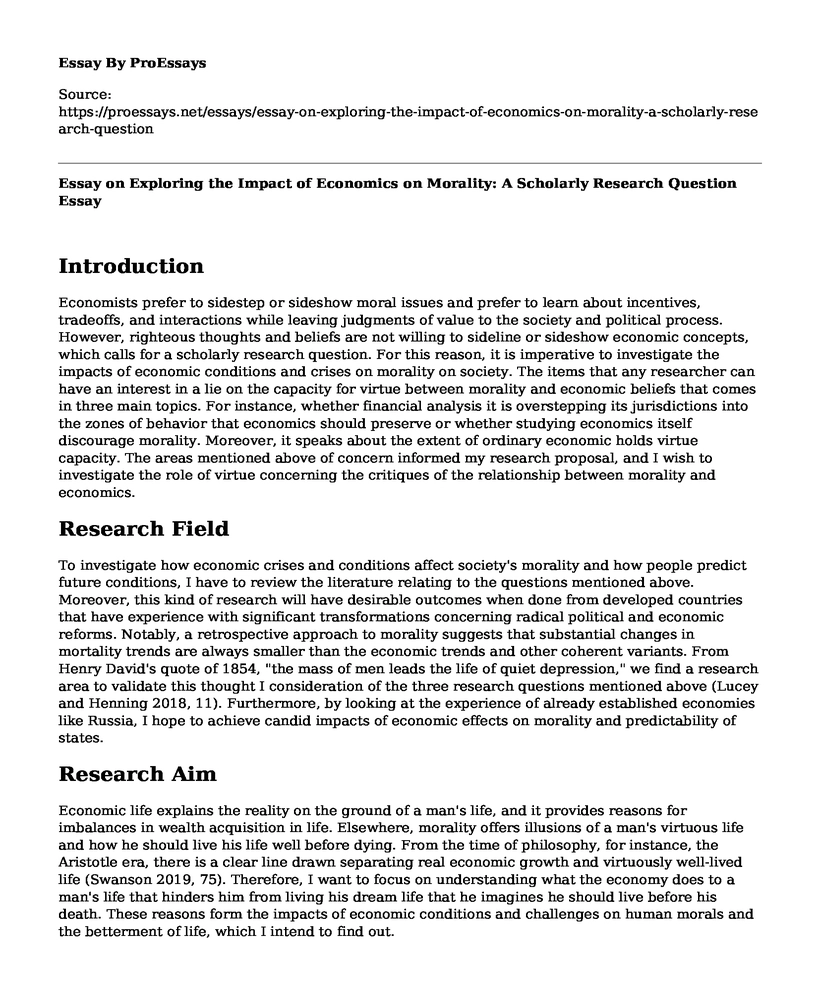Introduction
Economists prefer to sidestep or sideshow moral issues and prefer to learn about incentives, tradeoffs, and interactions while leaving judgments of value to the society and political process. However, righteous thoughts and beliefs are not willing to sideline or sideshow economic concepts, which calls for a scholarly research question. For this reason, it is imperative to investigate the impacts of economic conditions and crises on morality on society. The items that any researcher can have an interest in a lie on the capacity for virtue between morality and economic beliefs that comes in three main topics. For instance, whether financial analysis it is overstepping its jurisdictions into the zones of behavior that economics should preserve or whether studying economics itself discourage morality. Moreover, it speaks about the extent of ordinary economic holds virtue capacity. The areas mentioned above of concern informed my research proposal, and I wish to investigate the role of virtue concerning the critiques of the relationship between morality and economics.
Research Field
To investigate how economic crises and conditions affect society's morality and how people predict future conditions, I have to review the literature relating to the questions mentioned above. Moreover, this kind of research will have desirable outcomes when done from developed countries that have experience with significant transformations concerning radical political and economic reforms. Notably, a retrospective approach to morality suggests that substantial changes in mortality trends are always smaller than the economic trends and other coherent variants. From Henry David's quote of 1854, "the mass of men leads the life of quiet depression," we find a research area to validate this thought I consideration of the three research questions mentioned above (Lucey and Henning 2018, 11). Furthermore, by looking at the experience of already established economies like Russia, I hope to achieve candid impacts of economic effects on morality and predictability of states.
Research Aim
Economic life explains the reality on the ground of a man's life, and it provides reasons for imbalances in wealth acquisition in life. Elsewhere, morality offers illusions of a man's virtuous life and how he should live his life well before dying. From the time of philosophy, for instance, the Aristotle era, there is a clear line drawn separating real economic growth and virtuously well-lived life (Swanson 2019, 75). Therefore, I want to focus on understanding what the economy does to a man's life that hinders him from living his dream life that he imagines he should live before his death. These reasons form the impacts of economic conditions and challenges on human morals and the betterment of life, which I intend to find out.
Keywords: Morality, Economic Status, Projections, Spain, Russia.
Research Objectives
Investigating how economic conditions and crises affect the moral values of a society and its life predictability gives a broader understanding of the real-life of humankind. For this reason, my research proposal aims to achieve a more comprehensive understanding of how economic trends challenge the morality of a society. The recommendations after inform the third world state of the reality of life that economic turbulences can course to the virtue of a community. Moreover, my research proposal will also help struggling economies to plan on the reality side rather than live in fantasy and continue stagnating economy.
Conclusion
In an investigation, a study intends to find evidence-based answers to disturbing questions in life, which will, in turn, help better the lives of people. In this regard, I propose to find out why man must live with economic reality but not the fantasies of morality. My research, therefore, will be successful when conducted in a developed society that had financial misfortunes in the past to give a real picture of experience that will help the struggling communities.
Reference List
Lucey, T., and Henning, M.B., 2018. Guest Commentary: Citizenship, Economics, and Morality. Interdisciplinary Journal of Problem-Based Learning, 13(1), p.11.
Swanson, J.A., 2019. The public and the private in Aristotle's political philosophy. Cornell University Press.
Cite this page
Essay on Exploring the Impact of Economics on Morality: A Scholarly Research Question. (2023, Apr 06). Retrieved from https://proessays.net/essays/essay-on-exploring-the-impact-of-economics-on-morality-a-scholarly-research-question
If you are the original author of this essay and no longer wish to have it published on the ProEssays website, please click below to request its removal:
- Feminine Identity Essay Example
- Ethical Business Dilemma Essay Example
- Race and Identity Essay Example
- Research Paper on LinkedIn Company
- Lebanese Apples Inc. New Market Entry Paper Example
- Essay Sample on Unemployment Tax: Federal & State Rates & Factors
- Normative Ethics: Searching for Moral Standards - Free Essay Sample







